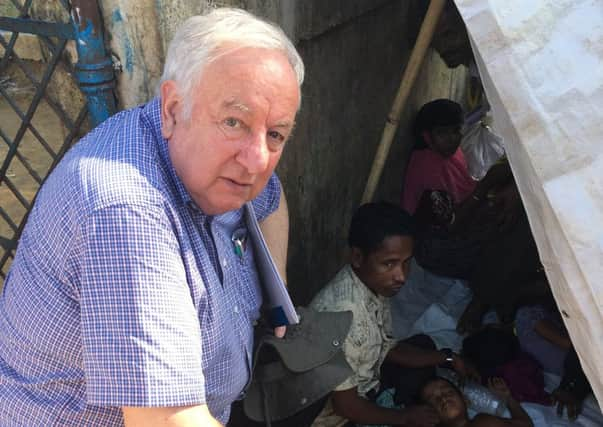Lord Faulkes witnesses refugee camp first hand


Children so hungry they simply couldn’t stand. Mothers, eyes red from crying. Men, broken by grief. Tents stretching out as far as the eye could see.
Nothing could have prepared Lord Foulkes for the horrors endured by these Rohingya refugees in a sprawling, disease-infested camp that has now swelled larger than both Edinburgh and Glasgow combined.
Advertisement
Hide AdAdvertisement
Hide Ad“We were standing there,” he said, “next to a tarpaulin sheet that stretched from the fence to the side of the road.
“Huddled beneath it were two families, two families living there. Not really living, just trying to exist. They slept there, they ate there, they barely survived.
“I’m well travelled, I’ve been around and seen many, many tough things in my lifetime.
“But I have to be honest – this is the worst I’ve ever seen.”
Advertisement
Hide AdAdvertisement
Hide Ad“It was all I could do not to cry in front of them. They just have no hope, it’s been snatched from them. The world has to do something.”
Anyone who knows George Foulkes, the long-serving Edinburgh politician and former Hearts chairman, will recognise all too well the mighty roar of his laugh and width of his grin.
Not many, though, will have experienced the haunting drawl or steely eye he has when left shocked to the core.
He was part of a group of six MPs and other foreign politicians in Bangladesh with the Commonwealth Parliamentary Association, when they asked to visit the border region.
Advertisement
Hide AdAdvertisement
Hide AdThey wanted to see for themselves what had become of the people forced out of Myanmar and were driven to Cox’s Bazaar. Located just a few miles over the border from Myanmar, the former port town has become the epicentre of the current refugee crisis.
Lord Foulkes said: “Before we left we heard there were 600,000 refugees there. When we got there, we found out that was now 826,000 people – that’s more than the populations of Edinburgh and Glasgow combined – the size of Scotland’s largest two cities.
“It was staggering. There were tents, and canopies and people as far as the eye could see in every direction. No schools, no toilets, no infrastructure – no hope.
“The people we spoke to told us it will reach a million refugees by Christmas. And they are being left here, forgotten by the world.”
Advertisement
Hide AdAdvertisement
Hide Ad“They stopped serving hot food, because they were worried about an outbreak of diarrhoea, they are worried about dysentery and other disease, they are worried about malnutrition, they are worried about the floods, and about mud slides.”
“But malnutrition – this is what they are worried about most. They are not getting food. Bangladesh is already one of the world’s most impoverished countries, and now they are trying to cope with this. They simply cannot cope.”
He called on his fellow citizens in Edinburgh and across Scotland to do what they can to help. He said: “The charities are mobilising, we have Sciaf, the Disasters Emergency Committee, Save the Children and others all seeking donations.
“I’d read about this crisis, like most people back home watched it on the TV. But nothing had me prepared for how dire a situation this is.
Advertisement
Hide AdAdvertisement
Hide Ad“I’d urge people to give what they can. If they can’t do that, they can write to their MPs and others, and ask them to ensure we do more for these people.”
Refugees spoke about the slaughter they left, the arrests and violence, of how women and children perished along with the men.
Foulkes added: “The ethnic killings, the genocide – for that’s what it is – has to stop. But until it does the world has to take notice and do all it can to help. Because these people have nowhere to go, nowhere to turn and no hope. They have nothing except us.”
“The UK has already donated to the cause, but it’s not enough. Other countries also have to get involved.”
For DEC Emergency Appeal, visit https://www.dec.org.uk/